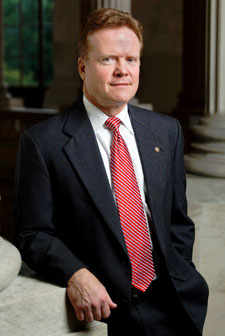One Vote Down, Several (Votes and More) to Go
Key Senate vote on ''Don't Ask, Don't Tell'' amendment succeeds; repeal advocates say vote marks the ''beginning of the end'' of the military policy
The Senate Armed Services Committee passed, on a 16-12 vote, the compromise language reached earlier this week intended to lead to the repeal of the military’s ”Don’t Ask, Don’t Tell” policy, according to several sources.
The Thursday evening, May 27, vote preceded full House consideration of the language, which was expected to come Friday. Supporters of repeal were cautiously optimistic about the House vote.
[UPDATE: After the Senate committee vote, sources began saying that the house vote could come Thursday night yet. Then, confirmation came from the sponsor of the House measure. “In the next 15-30 minutes, Congressman Patrick Murphy (D-PA) will offer his amendment to repeal Don’t Ask Don’t Tell on the floor of the U.S. House of Representatives,” according to a news release from Murphy’s office sent out at 8 p.m. Thursday.]

Senator Jim Webb
The Washington Post reported at a little past 6 p.m. that the Senate committee was considering the amendment in closed session, and news that the committee had voted came less than 45 minutes later.
Aubrey Sarvis, the executive director of the Servicemembers Legal Defense Network, responded with cautious optimism on Thursday evening, saying, ”The Senate Armed Services Committee passed a historic roadmap to allowing open military service but it doesn’t end the discharges. It is important for all gay and lesbian, active-duty service members, including the reserves and the national guard, to know they’re at risk.”
Human Rights Campaign president Joe Solmonese was more optimistic, saying, ”The importance of this vote cannot be overstated – this is the beginning of the end of a shameful ban on open service by lesbian and gay troops that has weakened our national security.”
The House vote, due to the placement of the DADT amendment on the schedule for consideration, was not expected to come until Friday. Despite that, much of the discussion on the House floor throughout the day on Thursday related to the DADT amendment.
Of the Senate committee vote, Servicemembers United executive director Alex Nicholson, a veteran discharged under DADT, said, ”All of us who have served under ‘Don’t Ask, Don’t Tell’ and who have been impacted by this law will remember this day as the beginning of the end for ‘Don’t Ask, Don’t Tell.”’
That this was only the beginning was echoed by the National Gay and Lesbian Task Force executive director Rea Carey: ”While this is progress toward ending an unjust law, we continue to call for clear assurances of protection, a specific timeline for repeal implementation, and an immediate halt to the discharges.”
Continued questions, however, were resulting from what people characterized as mixed signals coming from the Pentagon, as well as at least one senator’s view about the extent of the White House’s support for the compromise.
Sen. Jim Webb (D-Va.), the only Democrat on the Senate Armed Services Committee to vote against the compromise, talked to Metro Weekly on Thursday about his views, saying, ”I think it’s pretty clear. The White House came out and said that they would prefer to have the studies completed in order to get the participation of the military. Secretary Gates said he would prefer to have that.”
Webb was referring to the Monday evening letter from Office of Management and Budget Director Peter Orszag and the Tuesday morning Pentagon statement describing the views of Defense Secretary Robert Gates, as well as a series of letters from the current military service chiefs to House and Senate military oversight committee Republican leaders opposing the amendment.
Although Gates and Orszag both issued support for the amendment, both statements referenced the inevitability of congressional action and initial preference to wait for a vote until after the Pentagon working group had completed its review on December 1.
When pushed further, Webb said, in reference to Orszag and Gates, ”If you take a look at what they said, they both said they would prefer to have the studies done, and that was the commitment that was made in February, and I’ve been very involved in making sure we have a good survey.”
Although the letters of the service chiefs did not all take the precise same positions on the amendment – only two, Air Force chief of staff Gen. Norton Schwartz and chief of Naval Operations Adm. Gary Roughhead, specifically stated opposition to the amendment’s passage – the chiefs’ letters had an impact on the Hill on Thursday.
Webb, in his comments, and despite a response on Wednesday evening from John Shalikashvili, specifically noted, ”I think there’s a measure of respect here that goes to the service chiefs.”
A person lobbying Republican offices for support said on Thursday, ”The letter from the service chiefs killed us.”
Advocates of repeal had been cautiously optimistic about the Senate committee vote, having secured statements of support from 14 of the 16 Democrats on the committee, as well as Sen. Susan Collins (R-Maine). Sen. Evan Bayh (D-Ind.) was expected to – and did – vote yes, although he had not released a statement to that effect prior to the vote.
On Thursday prior to the vote, Collins said of her support, ”I’ve indicated right from the beginning that I thought the policy needed to be changed, but that we needed to proceed carefully because there are a lot of ramifications. I believe the Lieberman amendment strikes that balance.”
Sen. John McCain (R-Ariz.) refused to answer a question posed to him about the amendment on Thursday afternoon.
The White House did not respond to a request for comment about Webb’s remarks.
Support Metro Weekly’s Journalism
These are challenging times for news organizations. And yet it’s crucial we stay active and provide vital resources and information to both our local readers and the world. So won’t you please take a moment and consider supporting Metro Weekly with a membership? For as little as $5 a month, you can help ensure Metro Weekly magazine and MetroWeekly.com remain free, viable resources as we provide the best, most diverse, culturally-resonant LGBTQ coverage in both the D.C. region and around the world. Memberships come with exclusive perks and discounts, your own personal digital delivery of each week’s magazine (and an archive), access to our Member's Lounge when it launches this fall, and exclusive members-only items like Metro Weekly Membership Mugs and Tote Bags! Check out all our membership levels here and please join us today!

















